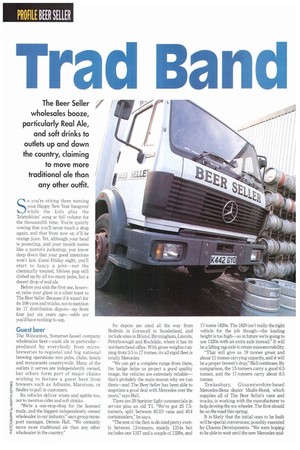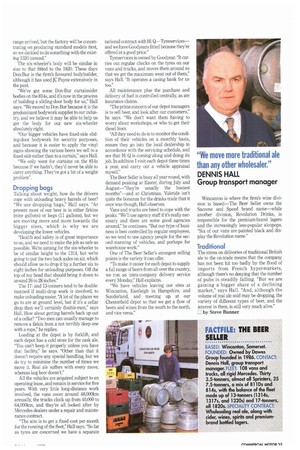Traci and
Page 34

Page 35

If you've noticed an error in this article please click here to report it so we can fix it.
The Beer Seller wholesales booze, particularly Real Ale, and soft drinks to outlets up and down the country, claiming to move more traditional ale than any other outfit.
So you're sitting there nursing your Happy New Year hangover while the kids play the Teletubbies' song at full volume for the thousandth time. You're quietly vowing that you'll never touch a drop again, and that from now on it'll be orange juice. Yet, although your head is pounding, and your mouth tastes like a parrot's jockstrap, you know deep down that your good intentions won't last, Come Friday night, you'll start to fancy a pint—not the chemically treated, lifeless pap still dished up by all too many pubs, but a decent drop of real ale.
Before yoti sink the first one, however, raise your glass in a silent toast to The Beer Seller. Because if it wasn't for its 108 vans and trucks, not to mention its 17 distribution depots—up from four just six years ago—odds are you'd have nothing to sup.
Guest beer
The Wincanton, Somerset-based company wholesales beer—cask ale in particular— produced by everybody from microbreweries to regional and big national brewing operations into pubs, clubs, hotels and restaurants countrywide. Many of the outlets it serves are independently owned, but others form part of major chains wishing to feature a guest beer from brewers such as Adnams, Marstons, or Smiles to pull in customers.
Its vehicles deliver wines and spirits too, not to mention cider and soft drinks, "We're a one-stop-shop for the licensed trade, and the biggest independently owned wholesaler in our industry," says group transport manager, Dennis Hall. "We certainly move more traditional ale than any other wholesaler in the country." Its depots are sited all the way from Bodmin in Cornwall to Sunderland, and include sites in Bristol, Birmingham, Lincoln, Peterborough and Rochdale, where it has its northern head office. With gross weights running from 3.5 to 17 tonnes, its all-rigid fleet is totally Mercedes.
"We can get a complete range from them, the badge helps us project a good quality image, the vehicles are extremely reliable— that's probably the main reason why we run them—and The Beer Seller has been able to negotiate a good deal with Mercedes over the years," says Hall.
There are 29 Sprinter light commercials in service plus an old Ti. "We've got 25 7.5tonners, split between 811D vans and 814 curtainsiders," he says.
"The rest of the fleet is divided pretty evenly between 13-tonners, mainly 1314s but includes one 1317 and a couple of 1320s, and 17-tonne 1820s. The 1820 isn't really the right vehicle for the job though—the loading height is too high—so in future we're going to use 1320s with an extra axle instead." It will be a lifting tag-axle to retain manoeuvrability.
"That will give us 19 tonnes gross and about 11 tonnes carrying capacity, and it will be a proper brewer's dray," Hall continues. By comparison, the 13-tonners carry a good 6.5 tonnes, and the 17-tonners carry about 8.5 tonnes.
Tewkesbury, Gloucestershire-based Mercedes-Benz dealer Mudie-Bond, which supplies all of The Beer Seller's vans and trucks, is working with the manufacturer to help develop the six-wheeler. The first should be on the road this spring.
It is likely that the initial ones to be built will be special conversions, possibly executed by Chassis Developments. "We were hoping to be able to wait until the new Mercedes mid range arrived, but the factory will be concentrating on producing standard models first, SO we decided to do something with the existing 1320 instead."
The six-wheeler's body will be similar in size to that fitted to the 1820. These days Don-Bur is the firm's favoured bodybuilder, although it has used JC Payne extensively in the past "We've got some Don-Bur curtainsider bodies on the 814s, and its now in the process of building a sliding-door body for us," Hall says. "We moved to Don-Bur because it is the predominant bodywork supplier to our industry, and we believe it may be able to help us get the body for our new six-wheeler absolutely right.
"Our bigger vehicles have fixed-side sliding-door bodywork for security purposes, and because it is easier to apply the vinyl signs showing the various beers we sell to a fixed side rather than to a curtain," says Hall.
"We only went for curtains on the 814s because if we hadn't, they'd never be able to carry anything. They've got a bit of a weight problem".
Dropping bags
Talking about weight, how do the drivers cope with unloading heavy barrels of beer? "We use dropping bags," Hall says. "At present most of our beer is in either firkins (nine gallons) or kegs (11 gallons), but we are moving more and more towards the bigger sizes, which is why we are developing the lower vehicles.
"Health and safety is of great importance to us, and we need to make the job as safe as possible. We're aiming for the six-wheeler to be of similar height to the 1314, but we're going to put the two back axles on air, which should allow us to drop it by a further six to eight inches for unloading purposes. Off the top of my head that should bring it down to around 26 to 28 inches."
The 17and 13-tonners tend to be doublemanned if multi-drop work is involved, to make unloading easier. "A lot of the places we go to are at ground level, but if it's a cellar drop then we'll certainly double-man," says Hall. How about getting barrels back up out of a cellar? "Two men can usually manage to remove a firkin from a not terribly deep one with a rope," he replies.
Loading at the depot is by forklift, and each depot has a cold store for the cask ale. "You can't keep it properly unless you have that facility," he says. "Other than that it doesn't require any special handling, but we do try to minimise the number of times we move it. Real ale suffers with every move, whereas keg beer doesn't."
All the vehicles are acquired subject to an operating lease, and remain in service for five years. With very little long-distance work involved, the vans cover around 48,000km annually, the trucks clock up from 40,000 to 64,000km, and they're all looked after by Mercedes dealers under a repair and maintenance contract.
"The aim is to get a fixed cost per month for the running of the fleet," Hall says. "So far as tyres are concerned we have a separate national contract with Hi Q—Tyreservicesand we have Goodyears fitted because they're offered at a good price."
Tyreservices is owned by Goodyear. "It carries out regular checks on the tyres on our vans and trucks, and moves them around so that we get the maximum wear out of them," says Hall. "It operates a casing bank for us too."
All maintenance plus the purchase and delivery of fuel is controlled centrally, as are insurance claims.
"The prime concern of our depot managers is to sell beer, and look after our customers," he says. "We don't want them having to worry about workshops, or who to get their diesel from.
"All they need to do is to monitor the condition of their vehicles on a monthly basis, ensure they go into the local dealership in accordance with the servicing schedule, and see that Hi Q is coming along and doing its job. In addition I visit each depot three times a year, and carry out a vehicle appraisal myself."
The Beer Seller is busy all year round, with demand peaking at Easter, during July and August—"they're usually the busiest months"—and at Christmas. Yuletide isn't quite the bonanza for the drinks trade that it once was though, Hall observes.
Vans and trucks are hired to cope with the peaks. "We'll use agency staff if it's really necessary and there are some good agencies around," he continues. "But our type of business is best controlled by regular employees, so we tend to use agency people for the second-manning of vehicles, and perhaps for warehouse work."
One of The Beer Seller's strongest selling points is the variety it can offer.
"To make it easier for each depot to supply a full range of beers from all over the country, we run an intra-company delivery service every Monday," Hall explains.
"We have vehicles leaving our sites at Wincanton, Eastleigh in Hampshire, and Sunderland, and meeting up at our Chesterfield depot so that we get a flow of beers and wines from the south to the north, and vice versa." Wincanton is where the firm's wine division is based—The Beer Seller owns the Saccone and Speed brand name—while another division, Revolution Drinks, is responsible for the premium-brand lagers and the increasingly less-popular alcopops. "Six of our vans are painted black and display the Revolution name."
Traditional
The stress on deliveries of traditional British ale to the on-trade means that the company has not been hit too badly by the flood of imports from French hypermarkets, although there's no denying that the number of pubs is steadily falling. "But we are gaining a bigger share of a declining market," says Hall. "And, although the volume of real ale sold may be dropping, the variety of different types of beer, and the interest in them, is still very much alive."
E by Steve Banner FACTFILE: THE BEER SELLER BASED: Wincanton, Somerset. FOUNDED: Owned by Dawes Group founded in 1986. CONTACT: Dennis Hall, group transport manager. FLEET: 108 vans and trucks, all rigid Mercedes. Thirty 3.5-tonners, almost all Sprinters, 25 7.5-banners, a mix of 811Ds and 814s, with the balance of the fleet made up of 13-tonners (1314s, 1317s, and 1320s) and 17-tonners, all 1820s. SPECIALITY CONTRACT: Wholesaling real ale, along with cider, wines, spirits and premiumbrand bottled lagers.
































































































